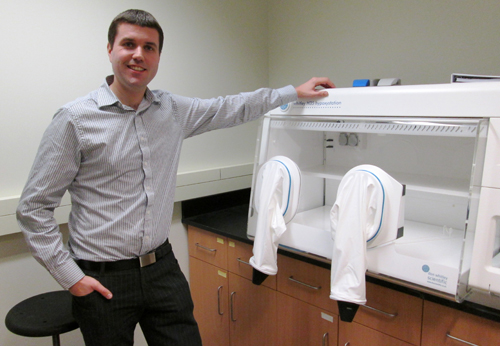
James Uniacke is a cancer cell’s worst nightmare. Having recently joined U of G, the molecular and cellular biology professor studies how cancer cells survive in low-oxygen environments, which could lead to new treatments aimed at destroying those cells.
Adapting to stress is key to a cancer cell’s survival. “Much like people, stress affects cells on a daily basis,” he says. Cells experience stress in the form of environmental factors, such as temperature, pH levels or lack of nutrients.
He will study how cells make proteins under stress. When cells are stressed, he says, they “take a vacation” and stop performing energy-consuming processes such as protein synthesis. Cells can survive in this dormant state for some time, and Uniacke is interested in learning how they continue to produce proteins using other methods.
“My work ties into cancer because a tumour is a very stressful environment,” he says, adding that tumour cells must cope with low pH levels and inadequate oxygen and nutrients. “In this sort of environment, a normal cell would die, especially when it’s exposed to prolonged conditions like this. Cancer cells adapt quite nicely.” Unlike normal cells, cancer cells don’t go on vacation when they’re stressed out. He aims to learn how to make tumour cells take a vacation – or even retire.
The main stressor he will study is lack of oxygen, also known as hypoxia. “Hypoxic tumours are actually very aggressive, so we’re trying to prevent cells from adapting to hypoxia.” His lab includes a hypoxic chamber that mimics the environment inside a tumour cell. Since most types of cancers form hypoxic tumours, learning how these cells adapt and survive within a low-oxygen environment can help researchers develop strategies to prevent them from doing so.
Understanding how a cancer cell adapts “makes it a prime target to treat with drugs, because your body doesn’t utilize these mechanisms,” says Uniacke. Normal cells wouldn’t be affected, he adds, because they aren’t regularly exposed to low oxygen levels. “It’s a very attractive target for drug therapy.” The drug could be delivered directly to the tumour using an injection or cream, depending on the tumour’s location in the body.
“If we can come up with a treatment that could equally treat 95 per cent of cancers, that’s pretty great.”
A more rudimentary approach to cancer treatment involves exposing tumour cells to oxygen, he says, a practice that began in the 1980s and continues to be used on hypoxic tumours that resist radiation therapy. The success of oxygen therapy is limited, he adds, because tumours aren’t connected to blood vessels that carry oxygen.
Before joining U of G, says Uniacke, “I was looking for a job where I could do research and teach equally.” He had heard good things about U of G from colleagues. He applied for one of four faculty positions in the Department of Molecular and Cellular Biology and started in December. “When I met everyone,” he says of his departmental colleagues, “the rumours were true.”
He was drawn to U of G because of its strong focus on undergraduate teaching and research. “They’re always pushing the envelope in terms of teaching,” he says. “Anyone I’ve ever talked to who were alumni of Guelph have said great things.”
Before joining Guelph, Uniacke spent four years as a post-doc at the University of Ottawa’s faculty of medicine. He describes the experience as “very research-intensive” but admits he missed teaching students. For his PhD at Concordia University, he looked at how algal cells make protein under stress. His interest in human health made him want his research to have “a measurable impact on society.”
Having experienced both sides of academia, he decided to split his time evenly between research and teaching. “I think in order for research as a whole to succeed, you have to teach it,” he explains. “I don’t just mean teaching in the classroom; I mean training graduate students and being a mentor to them.” He says he looks forward to inspiring his students to pursue careers in science.